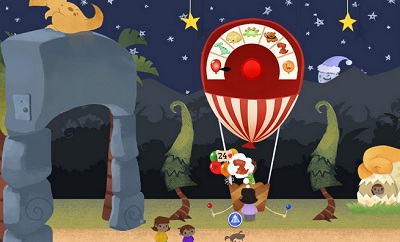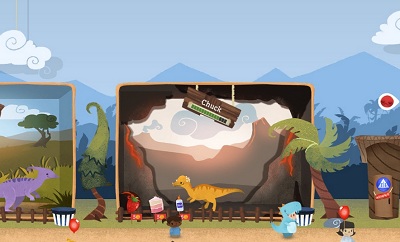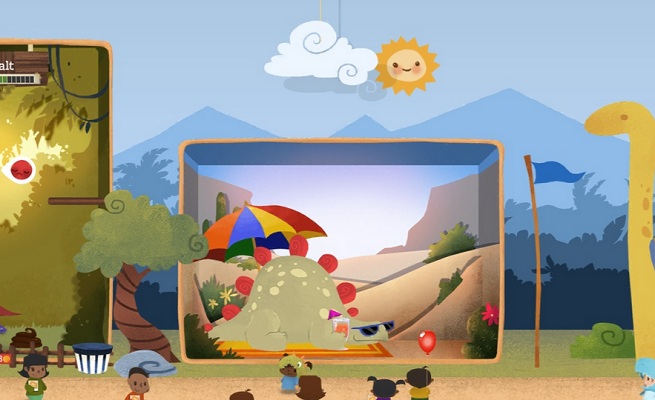James Miao grew up with a bunch of bad educational games that made his parents comfortable but bored him to death. To save today’s kids from such a fate, his startup Recurious has created an educational mobile game dubbed Dinorama.

The iPad simulation game has a dual purpose. It lets kids enjoy creating a dinosaur theme park, dubbed Dinorama, and it also teaches them how to save money and run their finances. It is one of many educational games on mobile platforms, but Miao hopes its distinguishing feature is that it will actually be fun to play. The game debuted on iOS last month.
I first ran into Miao and his co-founder Samuel Hsiung in 2007, when they started a game-inspired music site called Thesixtyone. The social network for music lovers was an early example of gamification, or using game mechanics in a non-game application, which is now quite fashionable.
“We’ve been thinking about taking games into apps that can become more playful for some time,” Miao told GamesBeat. “Thesixtyone combined music discovery with games. One of the artists that got a start on our platform was [the now-famous] Florence and the Machine.”
The network itself didn’t survive partly because a redesign went awry, and Miao moved on to create Aweditorium, another music discovery app that applied interaction to music album liner notes. That app became a top-five app for a number of months, generating more than a million downloads, but it also ran its course over time.
Then, Miao moved back into gaming with Recurious, a game studio focused on educational games for kids, where a child’s love for play goes together with a parent’s desire for learning. Miao said that the company will make a game only if its core mechanics can be naturally educational. The lessons from such games will only stick if the kid becomes emotionally engaged with the game. Miao isn’t ready to announce sales yet, but he says engagement is high with gamers playing an average of more than an hour each.
“What inspired it was that, when I was a kid, my parents didn’t let me have a Nintendo machine, so I played educational games on the PC,” Miao said. “I enjoyed some games, but most of it was clearly terrible, designed for parents and their insecurities about a child falling behind. You would only play it if forced to do so. But I really enjoyed simulation games like SimCity.”
 Sunnyvale, Calif.-based Recurious raised $1.5 million from Greylock Partners (in January 2012), the venture firm started by LinkedIn founder Reid Hoffman. It also has money from MIT Media Lab director Joichi Ito and the Y Combinator.
Sunnyvale, Calif.-based Recurious raised $1.5 million from Greylock Partners (in January 2012), the venture firm started by LinkedIn founder Reid Hoffman. It also has money from MIT Media Lab director Joichi Ito and the Y Combinator.
The team spent six months playtesting Dinorama with children ages 7 to 12. Every dinosaur in the game is named after one of the playtesters. Dinorama focuses on financial education since it is something that is valuable for young people but is often ignored by schools.
“I realize that a lot of learning has to be self-motivated,” Miao said. “One-size-fits-all education does not work. Gaming can be a very valuable tool. But it works only if the mechanics of the game are the thing that you need to learn.”
In the game, you don’t have a huge number of things to control. You run a dinosaur park that attracts tourists. You start with a single dinosaur and build amusements to attract more visitors. You have to make sure your park covers its costs and doesn’t run out of money. The mechanics include swatting flies and shoveling dinosaur poop.
But things don’t always go as planned in the game. Costs rise because of food shortages that drive up prices, and kids literally have to save for a “rainy day,” which hurts attendance at the park and drives up maintenance costs. The child has to understand that they have to save money to cover the rising costs that are both predictable and unpredictable.
“It teaches financial literacy, but it’s not about making kids focus on text about compound interest,” Miao said.
The company has just four employees. They build a two-dimensional graphics technology atop the Cocos2D game engine. That means the app will run on both old and new iOS devices. On the iPad, the game art is created in greyscale and is dynamically colored in the game.
The app is selling for $1.99 in the Apple iTunes App Storwe. It is aimed at kids ages 7 and up. Apple has featured it as a “New & Noteworthy” title and a “What’s Hot” attraction.
VentureBeat's mission is to be a digital town square for technical decision-makers to gain knowledge about transformative enterprise technology and transact. Learn More

